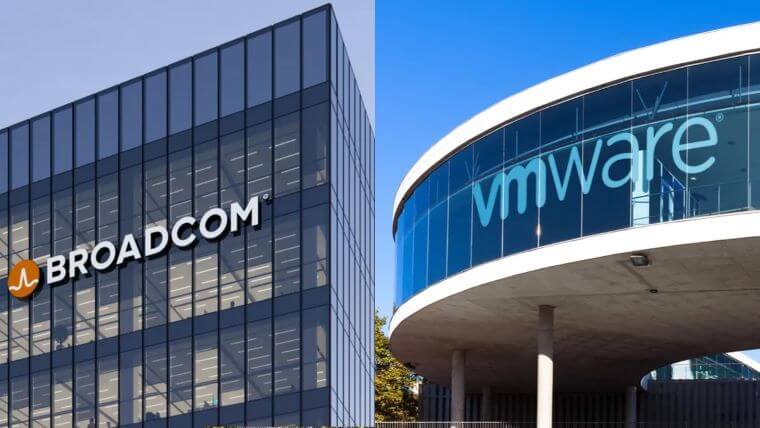The recent acquisition of VMware by Broadcom has sparked both interest and curiosity in the business world. Broadcom, a global technology company, has made a strategic move to acquire VMware, a leading provider of virtualization and cloud computing software.
This acquisition holds significant implications for the companies involved as well as the broader business landscape. SMBs (small and medium-sized businesses) are particularly interested in understanding the impact this acquisition will have on their operations as a whole.

While Broadcom’s proficiency in semiconductor solutions and VMware’s virtualization technology may promise a potential revolution in cloud computing, networking, and data center infrastructure, there are caveats to keep in mind.
The probable benefits of enhanced performance, scalability, and cost-efficiency for businesses may sound good on paper, but they may not necessarily translate into real-world results.
On that note, the primary issue here lies with SMBs who must brace themselves for possible shifts in pricing models or support structures following the acquisition.
It is necessary to comprehend just how Broadcom intends to incorporate VMware into its existing portfolio, as this will be instrumental in evaluating the long-term implications of this big move.
The Potential Benefits of the Acquisition for Small and Medium Businesses
The purported benefits of Broadcom’s acquisition of VMware, especially for small and medium businesses, are being amplified. That said, an expanded product portfolio may seem attractive to SMBs since it offers a wider array of supposedly tailored solutions.

However, this merger is essentially a facade that could potentially enhance support and services while promising that SMBs receive the much-needed assistance to maximize their investments.
Let’s try and maintain a realistic perspective here; the honest advantages have yet to be revealed. In addition, the boost in innovation opportunities resulting from this acquisition can prove to be a game-changer for SMBs. With Broadcom’s resources and expertise combined with VMware’s technology, there is a strong possibility of groundbreaking advancements in several industries.
While the acquisition presents benefits that are quite appealing, we have to carefully evaluate the application and real-world value of these improvements for small and medium businesses.
The question remains whether Broadcom will genuinely serve the needs of SMBs or primarily focus on larger enterprises. Conclusively, time will tell, revealing if this acquisition delivers on its promises for smaller businesses or falls short of meeting expectations.
Possible Challenges and Concerns for SMBs in Light of the Acquisition
The recent acquisition of VMware by Broadcom has indeed sparked a series of discussions, particularly among small and medium-sized businesses. The main point of contention is the integration process between them.
Merging diverse systems, processes, and cultures can be intricate and challenging, with potential risks of service disruption and productivity loss. Regardless, it’s important to note that such transitions often lead to greater innovation and efficiency in the long run.

SMBs may encounter another challenge in the form of changes to pricing or licensing models. Following the acquisition, adjustments to pricing structures or licensing agreements could take place, potentially effecting SMBs’ budgets and financial planning.
As the process unfolds over time, there could be alterations in the delivery or management of customer support, which could lead to delays or inconsistencies in resolving issues for SMBs that depend on VMware’s products for their operations.
The Pros and Cons: A Breakdown
The acquisition of VMware by Broadcom has generated excitement, as well as concern within the business community. As a global technology company, Broadcom’s decision to acquire VMware carries significant implications for small and medium-sized businesses.
On the positive side, the acquisition of VMware by Broadcom brings together two industry leaders with complementary strengths. This merger has the potential to build a powerhouse in the technology sector, offering innovative solutions and capabilities to businesses of all sizes.
By integrating Broadcom’s expertise in semiconductor solutions with VMware’s virtualization and cloud computing technologies, businesses utilizing these services can expect improvements in several areas, including:
- Performance
- Scalability
- cost-efficiency.
Additionally, this acquisition can stimulate greater investment in research and development, fostering additional advancements within the industry.
Given Broadcom’s substantial financial resources and extensive global presence, there is a possibility of expedited technological advancements that can greatly benefit businesses in diverse sectors.
With that said, there are potential drawbacks on the plate. One concern is that industry consolidation may limit competition and reduce options for businesses seeking alternative solutions, likely resulting in higher prices and/or limited choices for customers.
In short, while Broadcom’s acquisition of VMware might appear as an attractive opportunity for small and medium-sized enterprises, it also comes with its own set of risks that shouldn’t go overlooked.
VMware’s platform and Broadcom’s infrastructure software solutions play different roles within an enterprise, and together, they can address specific needs more practically and securely.




